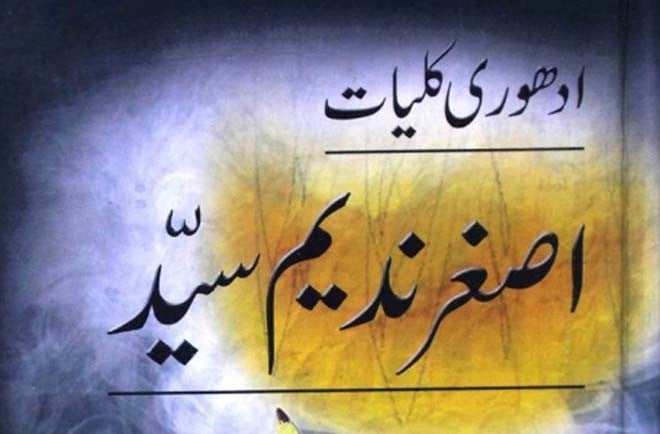
Rebellion in the initial phase followed by dissatisfaction and disillusionment and then a merger in a phase where he seems to have found love -- this is Asghar Nadeem Syed’s deep and illusive poetic journey

Before Asghar Nadeem Syed became famous as a tele playwright he was already a recognised poet. It is a subject of debate whether the preoccupation with writing plays, particularly for television, has affected the talent of Asghar Nadeem Syed as a poet.
It may be said that at some level all creative activity is interlinked but the time needed to be devoted to one particular form becomes a necessary condition for the blossoming of that art.
As it is, poetry is considered to be more organic and integrated in the person of the poet than the playwright who has to scatter himself before recollecting the totality of his vision.
It would remain debatable, whether one form impinges on the particularity of the other form, even if both are expressed through words. But if one indicator can be taken into consideration, the output of Asghar Nadeem Syed in poetry has been quite sufficient. It may not yet be complete as he himself calls it Adhuri Kuliyaat.
Whether the poet has exhausted himself with much still left to say but does not have the creative drive to fulfill that internal urge or that the constraint of external circumstances do not give him the time to pursue a path that requires more blood and sweat has been left to speculation.
Syed has been a very popular and successful playwright, much in demand and often pushed to write scripts for the ever growing visual media in the country. He is considered to be a playwright who does not only realise the niceties of the craft but has sufficient content to translate that effectively on to the screen. He has also written film scripts and screenplays and that too successfully.
Syed started to write poetry in the early 1970s and the tone and temperament of that time is visible in his earlier work. Soon, he had to face the wrath of a military dictator in the form of persecution -- transfers to far off places and in-service harassment, both for the ideas and the trade union activities of the academicians. The tone in those early poems is that of a rebel and not surprisingly; for the air that one breathed then was full of heat and dust of various movements taking place in the world. The Palestinians and other oppressed peoples in Africa were making their presence felt through acts and words. The poetry of those peoples and lands had started to colour the sensibility of those at home and Asghar Nadeem Syed could not have been immune to all that.
He is exclusively a poet of the nazm. He has not really been lured by the more traditional and familiar form of the ghazal, which has been the major form of our poetical expression.
This may be because when he was growing up as a poet, the nazm was considered a more challenging form -- the true representative of the sensibility of the poet in changing times. It was as if the sensibility needed a form for itself -- it had to be instantly crafted or crafted for the purpose and not as if the sensibility had to be fitted into the already laid-down format as in the case of ghazal. And hence it becomes more challenging because it involved a rebellion, even if the nazm that we know it is more than a hundred and fifty years old and it had to be given a requisite form according to what the poet felt or thought creatively about. Even the sensibility or theme of the poetic reaction meant crafting a new form, a new nazm, and that compounded the work involved.
One can sense the change in Asghar Nadeem Syed’s sensibility over decades with subtle changes in the formal structure of the nazm. There seems to be rebellion in the initial phase and a dissatisfaction that gradually yields to disillusionment, at times bursting itself into an angry charge or a repressed fury that sees opportunities go by. And then there is a merger somewhere in the middle phase where he seemed to have found love, a love being tested against the larger canvas of what he always stood for or understood life as a poet. This phase is more appealing because it moves away from the stated and the received. It explores areas that lie hidden beneath with decisive force but come into their own -- with the poet scratching the surface for deeper and illusive feeling and moods.
This is where it seems that he is adding more to the value of what is said to be objective in the light of what is truly subjective. It comes out in a new form, a new shape, a new compound of relationships at various levels and then yearns for an adequate expression in the more obvious world. There may be no startling innovation in imagery and the making of the metaphor in his poems but the already prevalent and seemingly stock imagery has been invested with a new feel.
The contribution of Syed has been in giving the prevalent word or a stock phrase a new lease of life. It may appear to have been said so many times growing out of the idiom of Urdu poetry but when placed in the context of the entire poem it radiates a new meaning and is representative of a new sensibility that may not seem to be so. The gradual unfolding of the way we feel and think has been the area of his poetic purview.